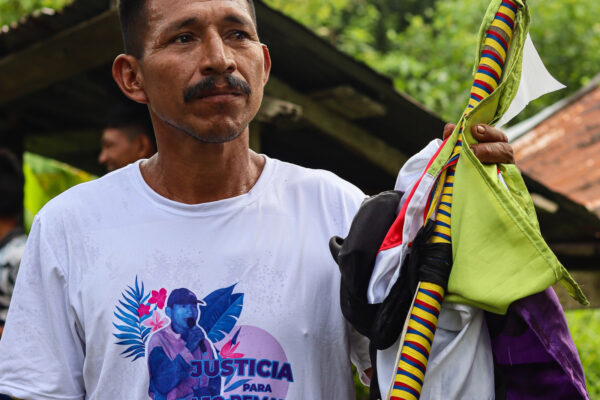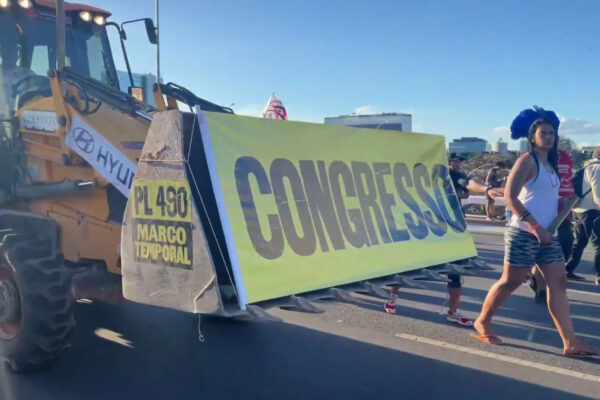Rio de Janeiro, Brazil – In a precipitous move last Friday, Brazil’s Ministry of Mines and Energy set December 15th as the date to auction the construction of the massive São Luiz do Tapajós hydroelectric dam, the first in a series of large dams slated for construction on the Tapajós River, one of the Amazon’s largest tributaries. The announcement immediately provoked the condemnation of local indigenous peoples, who criticized the federal government’s failure to ensure respect for their rights, as guaranteed by the Brazilian Constitution and international human rights agreements.
The move enflamed tensions in this precarious and remote region, while portending conflict with the region’s threatened indigenous peoples, particularly the Munduruku people, one of the largest surviving Amazonian tribes, whose territories and communities span much of the Tapajós basin.
In response to the announcement, the indigenous organization Movimento Munduruku Ipereg Ayu issued an open letter denouncing the Brazilian government’s “lies”, citing a recent meeting with high-level federal officials who promised that the dam would not proceed without a process of free, prior, and informed consultation with indigenous and traditional communities. Domestic law and international human rights agreements such as International Labor Organization Convention 169 (ILO169), to which Brazil is a signatory, require such consultations.
“We know that prior consultation should take place before any decision concerning the dam,” affirms the Munduruku statement, which demands the immediate cancellation of the auction. “Is the government throwing ILO169 in the garbage? Once again the government shows that it does not aim to dialogue with us.”
“This decision is another enormous blow to the indigenous right to consultation, just as we’ve seen with the Belo Monte dam,” said Maíra Irigaray of Amazon Watch. “President Rousseff’s administration’s disregard of Brazil’s traditional populations is shameful.”
The announcement of the São Luiz do Tapajós dam auction comes on the heels of an escalating controversy over the ambitious Amazon dam-building plans of the Rousseff government. Recent mega-dam projects – such as Belo Monte on the Xingu River, and Santo Antônio and Jirau on the Madeira river – have been plagued by major construction delays and massive cost overruns, in addition to serious socio-environmental impacts that have been left largely unmitigated by dam-builders. Suspicions of corruption within the dam industry have been heightened by a recent scandal involving Minister of Mines and Energy Edison Lobão, accused with grafting kickbacks from the state oil company Petrobras, which he oversees.
“In cases such as São Luiz do Tapajós, political decisions regarding which new dams will be built are based solely on the criteria of maximizing energy generation, without consulting indigenous peoples and before studies on the socio-environmental impacts and economic viability of projects have been completed. Moreover, there’s a chronic tendency for technical studies commissioned by dam proponents to seriously underestimate or simply ignore major social and environmental impacts and risks. Clearly, such practices contradict Brazilian legislation and international agreements such as ILO Convention 169 on free, prior and informed consultations and consent” noted Brent Millikan from International Rivers.
The São Luiz do Tapajós is the largest of seven large dams slated for construction on the mainstream of the Tapajós and one of its tributaries, Rio Jamanxim. Dozens of other large and medium-sized dams are also planned for construction on the Teles Pires and Juruena rivers, major tributaries of the Tapajós, three of which are already under construction. The majority of the projects would directly affect indigenous peoples and their territories, as well as other protected areas, including National Parks and National Forests.
Since mid-2012, bands of Munduruku warriors, together with women and children, occupied the Belo Monte dam site on two occasions, protesting the Brazilian government’s plans to build similar destructive dam projects on the territories in the Tapajós. Tensions intensified in late 2012 when the Federal Police shot and killed a member of the Munduruku tribe during a raid on wildcat placer mining, perceived as a form of intimidation aimed at reducing indigenous resistance to the dam projects. In mid 2013, when the Munduruku refused to allow technical teams conducting dam studies to enter their territories, President Rousseff ordered the Federal Police and National Guard to serve as their escorts, further escalating tensions in this remote corner of the Amazon. Still another source of tension has been federal government’s refusal to demarcate areas occupied by the Munduruku people, such as Sawre Muybu, that would be directly flooded by the São Luiz do Tapajós dam.
Read the Munduruku statement here (in Portuguese).
A press release by the Federal Public Prosecutors’ Office (MPF) on recent negotiations between the federal government and Munduruku on needs for prior consultations can be found here.













